
Considerations on the Death and Burial of Tristan Tzara is now available from Black Scat Books!
Isidore Isou, the founder of the artistic movement Letterism, was a great admirer of the Dadaist Tristan Tzara. So, when Tzara died in 1963, Isou disrupted the funeral to give the great provocateur a properly raucous sendoff. Isou’s lively account of the proceedings is both a polemic against traditional funerals and a warm declaration of his affection and admiration for Tzara.
Isou’s text was originally published in 1964. My translation was first published in a limited edition by Black Scat Books in 2012; this revised edition is much improved.
Tags: *Words · C
A grim little poem by that master of pessimism, Thomas Hardy, set here for three voices and bass instrument.

Tags: *Music · S
I appeared on Dean Bertram’s podcast Talking Weird to discuss my book Music From Elsewhere. You can see and/or hear it here.
Tags: *Music · *Words · T

TYPO 10 is now available from Black Scat Books! I contributed a translation of an “illustrated sonnet” by Giambattista Palatino from 1540: one of the first published rebuses and a true treat for the eyes.
I’m joined by a bewildering and international array of writers and graphic artists: Chiara Ambrosio, Tim Newton Anderson, Terry Bradford, Shawn Garrett, Edward Gauvin, Fritz von Herzmanovsky-Orlando, Thibault Jacquot-Paratte, Mark Kanak, Amy Kurman, André Pieyre de Mandiargues, George MacLennan, Frank Nims, Angelo Pastormerlo, Maurice Pons, Mirtha Pozzi, Bernard Quiriny, Jason E. Rolfe, Marcel Schneider, Walter Serner, Phil Demise Smith, Lono Taggers, Corinne Taunay, and Gregory Wallace. As usual, the whole thing is edited and designed by Norman Conquest.
Tags: *Words · T
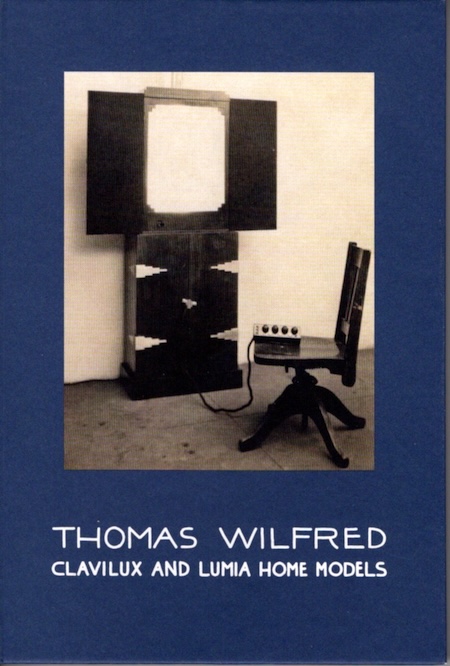
Thomas Wilfred: Clavilux and Lumia Home Models is now available from Christine Burgin Books, as part of the Further Reading Library. Christine Burgin and Andrew Lampert edited it, and I wrote the introduction. Here’s the publisher’s description:
Thomas Wilfred (1889–1968) devoted his life to the creation of a new art form, the art of light, which he termed “Lumia.” In the 1920s, Wilfred toured the US and Europe to great acclaim staging colored-light recitals with his Clavilux organ. By the late ’20s he had reinvented these large scale performances as self-enclosed light shows for living room entertainment. Wilfred’s aesthetically elegant and interactive Clavilux and Lumia home models were soon found in the collections of important art world figures and in major museums. His work was on view into the ’80s at MoMA, where it was seen by many of the artists who came to work with light as their medium in the ’60s and ’70s. Thomas Wilfred: Clavilux and Lumia Home Models presents a fascinating collection of archival material culled from the Wilfred archive at Yale University and other sources, including never before published sketches by Wilfred and documentation of these strange glowing screens that predated television, video art, and psychedelia.
Tags: *Words · T
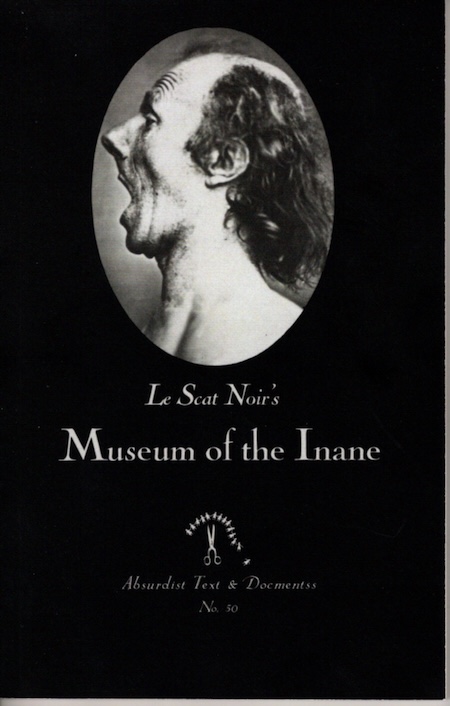
Le Scat Noir’s Museum of the Inane is now available from Black Scat Books! This anthology of fiction, drawings, collages, and, above all, nonsense, was edited by Norman Conquest and features a glittering array of nonpareils: Rhys Hughes, Lono Taggers, Phil Demise Smith, T. Motley, Catulle Mendès, R J Dent, Boris Glikman, David Paddy, David Macpherson, Norman Conquest, Amy Kurman, Allan Randolph Kausch, Mark Kanak, Ivars Balkits, and Tom Barrett. I contributed a rollicking tale in verse, “Dover and Larson.” Bask in the inanity!
Tags: *Words · S
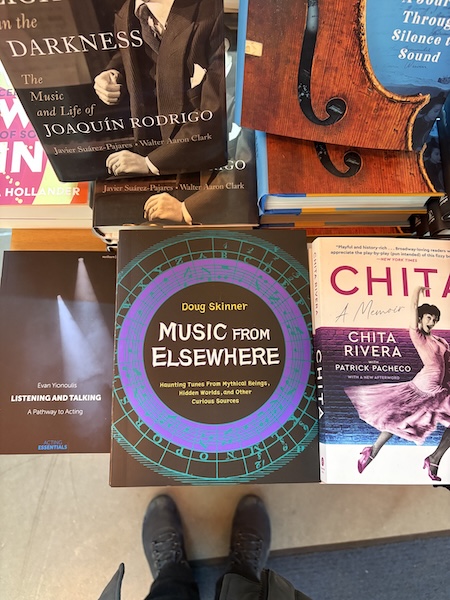
Thanks to Winston Hunter, here’s a photo of Music From Elsewhere in the Juilliard Store in NYC. Read and learn, students!
Tags: *Words · M
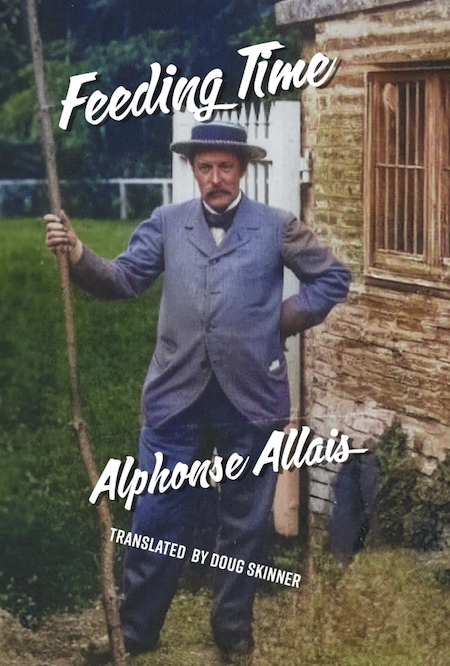
Feeding Time is now available from Black Scat Books!
This collection of Alphonse Allais’s short pieces, originally published in 1897, shows the great French humorist at his best, spinning out stories, fables, dialogues, and articles with elegance and imagination. You’ll find clandestine train stations and incandescent leeks, the rules for attending funerals with a bicycle, proposals for celluloid money and explosive confetti, the diplomatic problems of flatulence, and a gallery of swindlers, lovers, and adulterers. Allais’s most popular character, Captain Cap, appears to describe cannon billiards and to suggest replacing carrier pigeons with fish. Translated, annotated, and introduced by Doug Skinner, who also drew the frontispiece.
With this book, Black Scat Books’ editor Norman Conquest and I complete our Alphonse Allais library. It includes all eleven of the collections Allais called his “Anthumous Works,” plus six additional volumes: Captain Cap: His Adventures, His Ideas, His Drinks; The Blaireau Affair (Allais’s only novel); Selected Plays of Alphonse Allais; I Am Sarcey (his stories featuring Francisque Sarcey); Alphonse Allais’s Masks: Deluxe Special Edition (an illustrated version of one of his stories); and a sampler, The Alphonse Allais Reader.
Allais’s work was praised by, among others, André Breton, René Magritte, Umberto Eco, Rachilde, Marcel Duchamp. Harry Mathews, and the Collège de ‘Pataphysique. And here it is for English readers!
Tags: *Words · F
A drinking song by Thomas Chatterton, from his play The Revenge, set here for SATB. This is the first page.

Tags: *Music · B
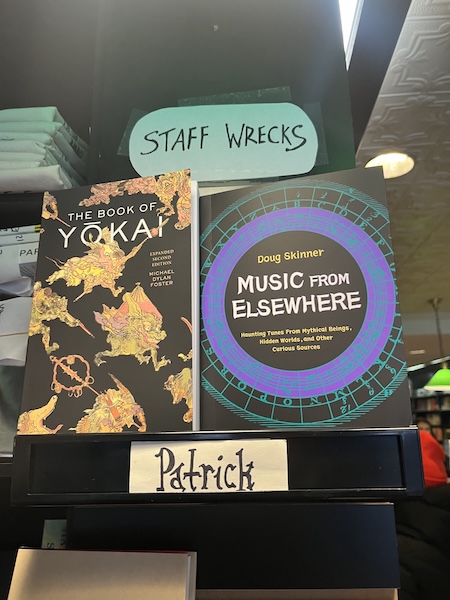
Tyler Maxin snapped this photo of Music From Elsewhere in the Community Bookstore in Brooklyn. Thanks, Tyler! And I’m glad you enjoy it, Patrick!
Tags: *Words · M








